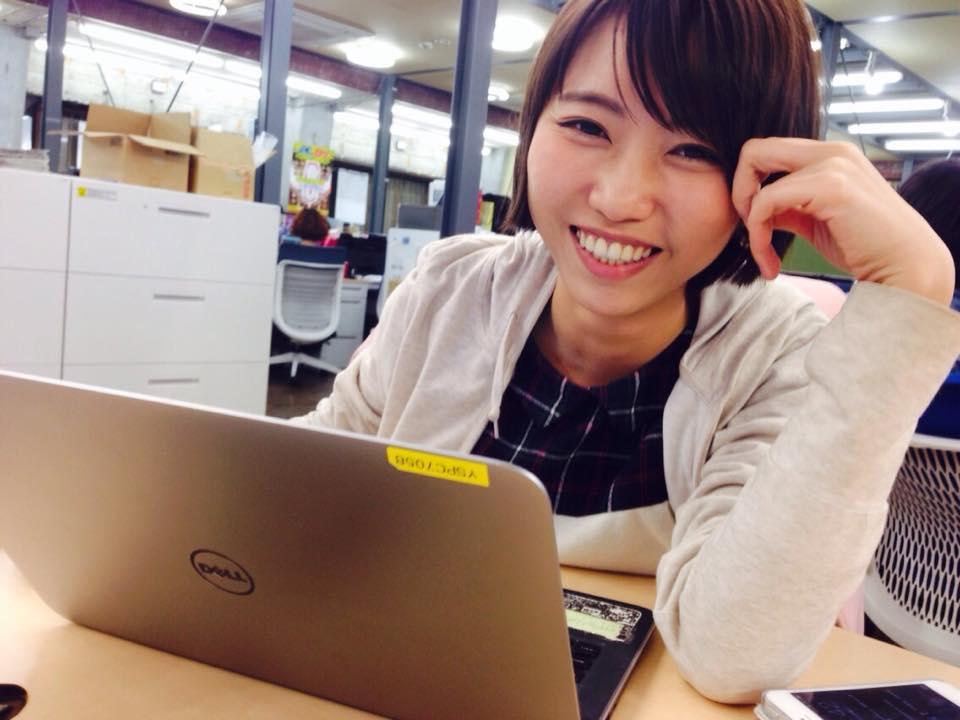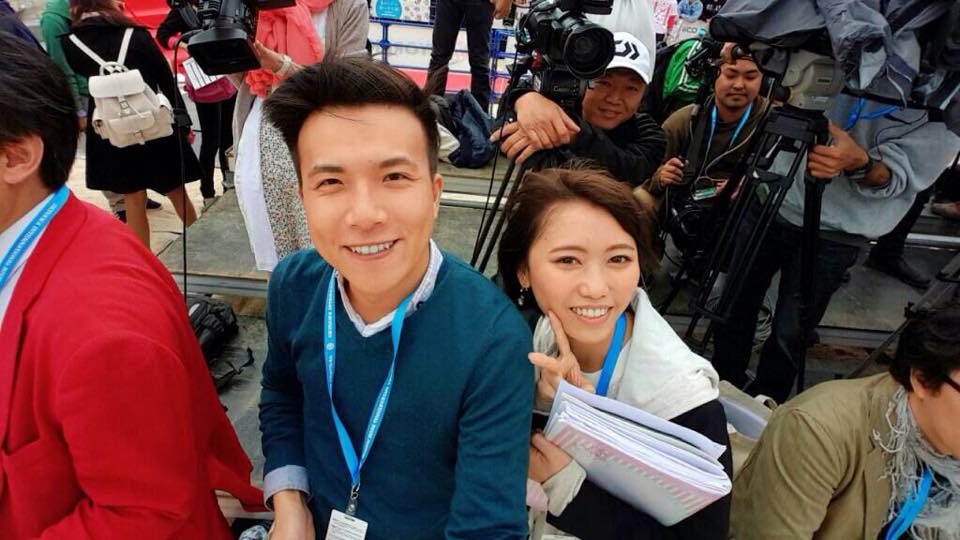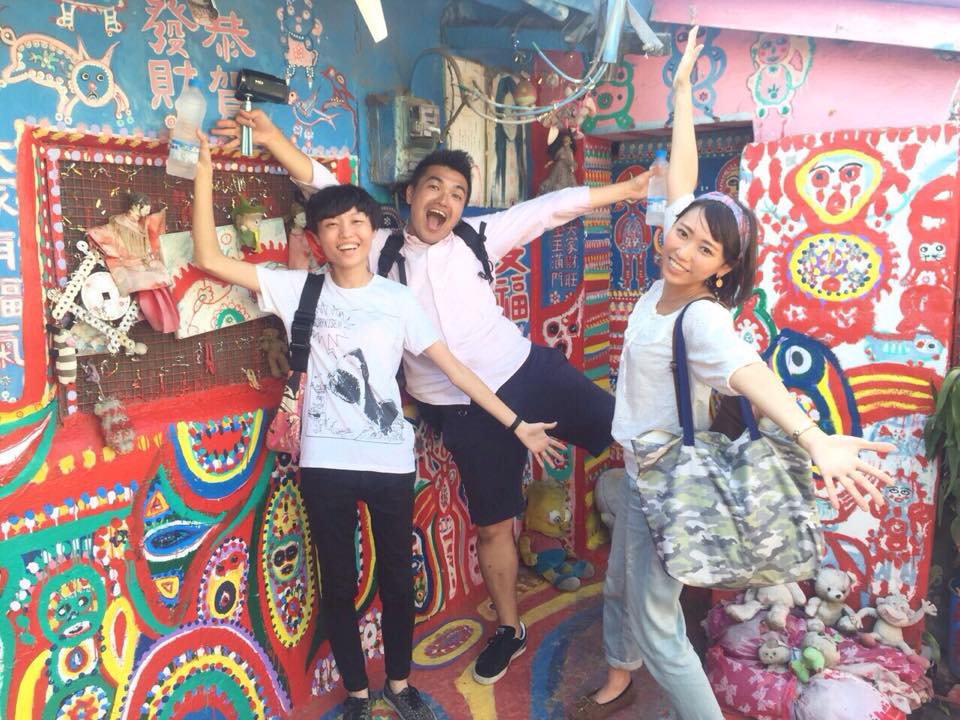Opportunities are for those who don’t give up: Mayu, Assistant Producer, Yoshimoto Kogyo
If you are a fan of Japanese comedy, you must be aware of the existence of Yoshimoto Kogyo. Mayu learned about Atsushi Tamura from the comedic duo London Boots #1 #2 (Lonboo) that is represented by Yoshimoto agency ten years ago and he became her ambition to work at Yoshimoto even though she had no idea what was ahead of her. However, ten years later, we are now in Yoshimoto’s Tokyo headquarter listening to the journey of her dream.
(The interview was taken in 2015)
The attack of a Lonboo fan girl
I started watching Japanese comedic television program when I was in junior high school, and I had fallen in love with it ever since. I’ve become Atsushi Tamura’s (London Boots #1 #2) fan since the first time I watched their show “London Hearts.” He’s not only a good comedian but also a good host. It’s no doubt that he is smart and has lots of original ideas, not to mention that he is always not afraid to try new things. I feel like he is quite different from other comedians due to the fact that he is true to himself and always nice to people around him.
During that time, Atsushi started a visual J-rock band called “jealkb” with other comedians out of jokes. The band performed in Taiwan. As a fan, I went to the concert and hoped that more people could know about them. However, I was disappointed that there was not much promotion about the band. I even called the record company hoping that they could do more promotion. That was the moment that made me ponder, what could I do for Atsushi besides being a fan? Both Atsushi and jealkb are under Yoshimoto production, which is the biggest comedian management company in Japan. And it was after knowing about jealkb and other members of the band that made me realize, that all members except Atsushi have been doing part-time jobs to make their living. Therefore, I set a goal for myself at that time, that I’m going to work in Yoshimoto, and I’m not only doing this for Atsushi, but also for other comedians who are chasing their dreams.
I didn’t speak much Japanese back then, and I didn’t know much about the entertainment industry in Japan, either. My family and friends only saw me as a crazy fan girl, thinking that I would give up sooner or later. However, I was seriously planning my life according to the goal I set for myself. I majored in Japanese in college while working part-time jobs to save money for my yearly trip to Japan. In the meantime, I also went to Atsushi’s television recording and live events to relax myself. Atsushi is someone who treats his fan very well. He remembered me and kept encouraging me during that time, and because of that, I had the courage of keep moving forward.
After graduating from college, I worked in the Taiwan office of a Japanese company while preparing for my journey to Japan. After a few years, there was an internal opportunity to transfer to Japan office, and I applied immediately. I told the interviewer honestly that the reason I wanted to go to Japan is to work for Yoshimoto; I would quit as soon as I have saved enough money. The interviewer did not kick me out of the room; instead, he encouraged me to go after my dream. Because of that, I got the opportunity and transferred to Japan.
After a year when I had saved enough money, I left the company as planned to start preparing to work in Yoshimoto. Until now, I’m still grateful for the company’s understanding and encouragement of my former colleagues. Even now they are still giving me power every time I think of them, and I’m proud that they are part of my journey.
Besides being an agency, Yoshimoto is a conglomerate of related entertainment businesses. There are production companies relating to television program, movies, Internet and merchandise, not to mention operating theaters for comedy performance. Apart from that, Yoshimoto also have schools specializing in training comedians and entertainment industry professionals. After resigning from my previous job, I worked part time jobs and went to YCC (Yoshimoto Creative College) at the same time, learning about the Japanese entertainment industry with the hopes of interviewing for a position in Yoshimoto a year later. I still remembered receiving a letter from Atsushi before the interview, encouraging me to keep chasing my dream no matter what happens. I tried my best, but failed my first interview. When I received the rejection letter, with tears streaming down on my face, I had no idea what I should do next.
I still remembered vividly. It was three days before I was to go back to Taiwan. The luggage was already packed. My colleagues were planning a farewell party that day, and I was ready to seek another path of my life. Out of the blue, I received a phone call from Yoshimoto, asking me for an interview in two hours. I answered “yes” before realizing I have no time to change, and went to the interview with shorts and high-heel. It turns out that the interviewers were Yoshimoto’s president and board member. I spoke to the two senior Yoshimoto officials about my passion with my accented Japanese, and right after the interview, they told me that they appreciated my dream and passion and decided to hire me on the spot. The first step of my dream just realized with such a dramatic twist, and I was tearing up already before I had a chance to thank them. The farewell party then turned into a celebration, surprising everybody, and we were all crying tears of happiness.
Blood, Sweat & Tears of a Yoshimoto Producer
After entering Yoshimoto, I started to work as a producer in the production team, in charge of program planning and scheduling. On top of that, I also had to arrange location shooting for photography teams and artists in this multi-tasking, challenging job. Japanese entertaining industry has a seniority-based system, and there are lots of unspoken rules in the industry. Furthermore, Working with artistic people could be difficult at times. With long and irregular working hours, people can easily get irritated with one small mistake in the program. There are no advantages whatsoever of being a foreigner producer in Japan. From the start, I couldn’t keep up the fast pace of production, and got scolded a lot. Everyday I finished my work past midnight, getting too tired to talk, and just fell asleep on the bed without a second thought. But thanks to the encouragement of my colleagues, I knew that all the mistake and minute details could be valuable lessons for a new producer, renewing my original passion of working with Atsushi in the future. “Just one more step,” I told myself everyday, after seeing the result of my work, and be ready to fight another day.
Yoshimoto has been keen on developing overseas markets in recent years. Taiwanese and Japanese cultures have close affinities, and therefore have many collaboration opportunities between the two countries. Being a Taiwanese, I was naturally assigned to handle related tasks. For example, the “Smiley haunted house in Okinawa”, opened in March 2015 in Naha, has Taiwanese travelers as one of the main target audience, and I was in Okinawa with a television team shooting promotion video and even had a short cameo. Also in 2015, Yoshimoto started a “Longstay in Asia” project, sending their comedians to other Asian countries and promoting Japanese comedy culture. A comedy duo called Manzai Bon Bon was sent to Taiwan, and I was assigned to support them. Although comedians may look quite glamorous on stage, not many comedians can make a living from it in reality. Seeing them trying their best to chase their dreams in a foreign country, I couldn’t resist reflecting my own journey onto theirs, and giving them my supports along the way. Yoshimoto has the kind of job that pays little, always works overtime with long commutes, but oddly always attracts the dreamers.
Having worked extensively with Taiwanese and Japanese project teams, I noticed many differences between the two cultures. Japanese usually plans ahead in details, and everything is done accordingly. Whereas Taiwanese often starts with no particular plans, and improvises on the spot. Once I accompanied a Taiwanese team for a location shooting in Japan. When we arrived and everything was set to start, the shooting was suddenly suspended because someone wanted to buy a popular chocolate. There are also differences in the studio production focus. Japanese program always center on the talents, and therefore the priority of the producer is to take care of them, making sure that they are in the best condition. Whereas in Taiwan, the process is controlled by the director. So after years of experiences, you know whom to suck up to keep the show running.
Just by my description, I believe that you could easily imagine the culture shocks when two teams are working together. To make sure everything goes smoothly, I need not only to translate but also to appease everyone. At the end, I was often stuck awkwardly in the middle. But to see this in another point of views, isn’t it the perfect job for me? This could be my lifework, connecting Taiwanese and Japanese and let them respect each other’s working culture.
Dreams to be continued
jealkb is going to hold a concert in Taiwan this November. After my endless self-promotion in Yoshimoto, almost everybody knows that I am Atsushi’s devoted fan, and the company let me work in the concert as a staff. From the first moment I got to know about Atsushi ten year ago, until this day I could finally say I have realized my dream with this opportunity.
I do not want to glorify the process; I have been though a lot chasing my dream. To work in the entertainment business, one needs to cope with stress extremely well and be very flexible. As a foreigner, I need to work much harder than my Japanese colleagues. Last year I took a long medical leave because of poor health condition, and I also broke up with my boyfriend at the time. There are times when I asked myself why do I keep moving forward? The answer might be that I don’t want to disappoint those who had helped me, including my friends and my family, and I don’t want to let my sacrifices go wasted. The harder I worked, the greater sense of accomplishment I felt. For now, I have a bigger dream, which is to promote and expand Japanese comedy culture in Taiwan. And as long as I could dream, I would keep moving forward.









